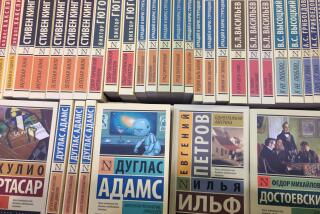Bitter, Broke, African Students Abandon Russia : Education: The Soviet regime had offered them full scholarships plus monthly stipends, free room and board, free medical care and free winter clothing. But hard times have arrived.
MOSCOW — When Domingo Co arrived in 1987, he entered a fully subsidized student world teeming with thousands of other Africans and fantasized about his fabulous academic future.
Eight years later, he’s broke, he’s the only African student left in his department and he dreams about nothing but his plane ticket back to Guinea this summer.
The collapse of communism and the economic turbulence that followed hit many Russians hard. But the once-coddled African students, many of whom come from desperately poor or politically chaotic nations, feel the pinch even worse.
Co is one of thousands of African students fleeing, or trying to flee, the daily struggle of their lives in post-Communist Russia.
The exodus has been gradual but substantial. Nigeria, for example, has seen the number of its students across the former Soviet Union drop from 5,000 in 1990 to barely 500 five years later.
“I always thought one must suffer for what one wants. I’ve had enough suffering,” said Co, tidying his cramped dorm room at Patrice Lumumba University of Peoples’ Friendship in southern Moscow.
“It’s time to go home,” the 27-year-old history student said.
The Soviet government spent huge sums on foreign students, especially those from developing countries. Post-colonial Africa was fertile ground for Soviet attempts to spread Lenin’s socialist model.
Aissatore Toure came from Mali to study linguistics at Lumumba, a Soviet showcase founded in 1960 by Nikita S. Khrushchev and named for a Congolese revolutionary. About 900 of the university’s 6,500 current students are African.
Toure still recalls some of the phrases used by university recruiters: “Proletarian solidarity, the harmonious international collective,” she said, smiling ironically.
To achieve that solidarity, the Soviet government offered students from the developing world full scholarships plus monthly stipends, free room and board, free medical care and free winter clothing.
Along with free education, the ideology that inspired students such as Toure to come here has virtually vanished as well.
Lumumba now houses an international business school, and one of the bulletin boards at the university is plastered with flyers advertising “The Way to Put Money Straight Into Your Pocket.”
“I saw the Soviet Union as a place of promise,” she said. “Now I know Mali has the only future for me.”
Many of the African students now find they don’t have the means to complete their degrees. Toure doesn’t even have enough money to get her leaking refrigerator fixed.
As state education funds dwindled, Russian universities and colleges introduced tuition. Moscow State University now charges foreign students up to $6,000 a year. Most African students don’t have that kind of money.
To survive the cash crunch, African students have turned to everything from waiting tables to drug dealing to prostitution.
“I’ve seen so many students skipping classes because they have to pay someone off or make a deal somewhere,” said Olatungi Ogunyemi, a Ph.D candidate at Moscow State who has been here since 1986. “This is not education.”
Empty pockets are just part of the “new Russia” for African students, who make up more than half of the 20,000 foreign students in Russia.
Africans have also become unlucky targets of racism that has burst forth after decades of being pent-up under Soviet rule.
“People used to just look at me strangely in the Metro. But now I get called a monkey almost every day,” said Eduardo Vita, a law student from Angola, who says he has been beaten by drunk Russian students several times.
Ogunyemi said, “At least before you could turn to the police. These days there’s no one to defend you.”
Another dangerous consequence of disappearing subsidies for African students has been the loss of free medical care. Unclean dormitories and lack of money for adequate food have left students susceptible to disease and malnutrition, according to the International Red Cross in Moscow.
More to Read
Sign up for Essential California
The most important California stories and recommendations in your inbox every morning.
You may occasionally receive promotional content from the Los Angeles Times.










